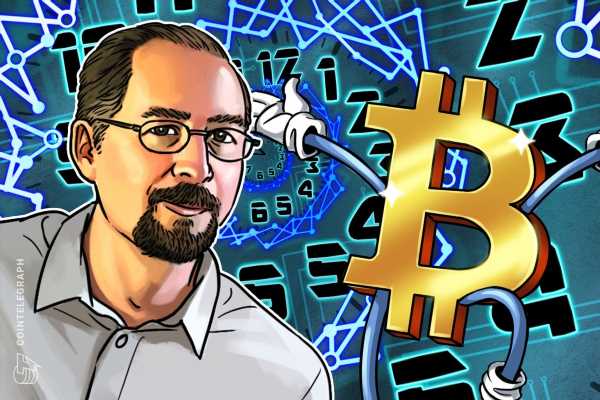Blockstream will look to raise more capital to buy Bitcoin (BTC) mining hardware through a second series of its Blockstream ASIC (BASIC) Note offering, which aims to accumulate and sell ASICs based on the predicted demand for miners over the next two years.
Speaking exclusively to Cointelegraph, Blockstream CEO Adam Back highlighted a surplus of Bitcoin mining hardware on the secondary market as a critical driver for a second series of its investment offering.
Series 1 sells out
Blockstream wound up an initial $5-million raise, which saw the firm purchase unused, boxed Antminer S19k Pro ASIC miners for $4.87 million. The company managed to secure the hardware, one of the Chinese manufacturer’s most popular miners, through SunnySide Digital.
“It presents an opportunity because the Bitcoin price is up 2.8 times, and the miner price is down. Regarding a reference point, ASICs were selling at $35 per terahash at the beginning of the year and now $13.5 per TH on this purchase,” Back explained.
Related: Perfect storm for undervalued ASICs: Blockstream plans $50M raise to buy miners
The CEO added that ASIC prices are down 2.6 times their dollar cost from January 2023 and 6.6 times in Bitcoin. The latter is what matters to Back, who said Blockstream will store the hardware in warehouses and sell it on the market as miners look to bring more hardware online as profitability increases alongside the projected upside value of Bitcoin:
“Accidental beneficiaries” of BASIC Note’s strategy
Timing the sale of miners is another consideration altogether, which will have to factor in several metrics. One potential tipping point could be the reduction of available miners on second-hand markets. Back said this will force buyers to go directly to manufacturers, driving the price per terahash of units to rise.
Blockstream experienced this firsthand in 2021 when it acquired miners for its hosting service. However, the company ran out of capacity to run the hardware for clients and eventually sold some surplus miners for “three to four times” higher than it had bought the miners.
Related: Blockstream CEO Adam Back talks Bitcoin over a game of Jenga
“That wasn’t our plan to get into the miner reselling game, but we had more inventory than hosting, so we sold off the surplus. That opened our eyes to this dynamic between ASIC and Bitcoin prices,” Back explained.
The Bitcoin bull run effect
Becoming “accidental beneficiaries” of the strategy underpinning the BASIC Note also highlights the importance of the “time value” of money and why the price of Bitcoin remains crucial in selling Bitcoin mining hardware for profit.
Back explained that miners typically buy hardware for a dollar amount and calculate how much Bitcoin they can mine from that point. However, one has to factor in shipping times from a manufacturer, which means that the investment only begins to generate value once it arrives and is powered up.
“We said to people, ‘You can pay the manufacturer $60 a terahash, for example, but you’ll lose $50 waiting for it to arrive. Or you can pay us $100 per terahash. That’s a win for you because we can give it to you immediately,’” Back said.
Related: Venture capital’s ICO gambits left Bitcoin ecosystem underfunded — Adam Back
The Blockstream CEO said that previous Bitcoin bull runs have resulted in situations where the electricity cost of mining drastically drops in percentage due to the increase in BTC’s value.
“The profit is like three times higher when the price doubles. In that situation, people go from being willing to pay $30 to $40 per terahash to being willing to pay between $100 to $130 per terahash, which is what happened last year,” Back recalled.
This presents the “tail end” opportunity to sell Bitcoin mining hardware that Blockstream has acquired.
BASIC Note will be reactive going forward
Blockstream’s BASIC Note Series 2 offering will likely be reactive to market conditions and demand from investors. Back noted that gauging how much hardware is available to buy on secondary markets is not so clear-cut despite depressed prices suggesting a surplus of inventory.
Luxembourg-based security tokens platform STOKR will manage the second series, which is set to go live around the turn of the new year. The product is available to accredited non-United States investors and requires a minimum $115,000 investment paid in BTC, Liquid Bitcoin (L-BTC) or Tether (USDT).
Magazine: Bitcoin 2023 in Miami comes to grips with ‘shitcoins on Bitcoin’
Source: Read Full Article
-
Binance’s New CEO Unveils Bold Vision For The Crypto Titan – Coinpedia Fintech News
-
Cardano Reveals State of 3 Critical Indicators to Trigger the Long-Awaited Vasil Upgrade
-
Ethereum Price Analysis: ETH Rally Could Extend Above $2,000
-
Cardano DEX MuesliSwap to refund users after slippage confusion
-
Bitfinex partnership pushes crypto adoption in Latin America


